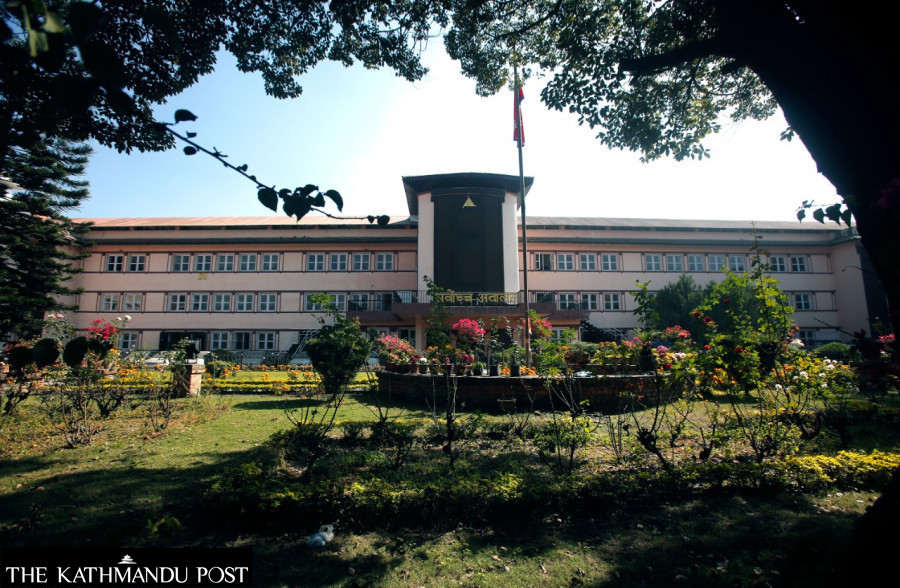National
Supreme Court ends police retirement dispute
In a reprieve for government, 30-year police retirement rule stands despite continued lobbying against it.
Binod Ghimire
The Supreme Court has cleared the deck for the government to retire police officers who have served for 30 years.
After a two-day hearing on a petition from the Ministry of Home Affairs asking the court to vacate its earlier decision, a division bench of the top court on Friday scrapped the interim order issued by a single bench that had allowed police officers to remain in service even after completing three decades.
Twenty-one senior officers of the Nepal Police led by Senior Superintendent of Police Jeevan Kumar Shrestha had filed a petition at the Supreme Court to allow them to continue their service even after completing 30 years.
The petition was lodged against the Office of the Prime Minister and Council of Ministers, the Ministry of Home Affairs, the Nepal Police Headquarters, and the Police Record Management Department, seeking to halt their scheduled retirement on September 1 due to the 30-year service rule. Rule 127 of the Police Regulations mandates that police personnel retire after 30 years of service, even if they have not reached the maximum retirement age of 58.
On August 22, Justice Hari Prasad Phuyal ordered the relevant government authorities to halt the enforcement of the 30-year provision and instructed the Nepal Police to correct its record books. By then, the police had already issued retirement letters.
Following the interim order, Nepal Police Headquarters had directed all of its provincial offices not to implement the earlier decision on retirement.
Seeing the court’s order as an overreach into the executive’s turf, the home ministry appealed to the court on August 27 demanding that the order be vacated. Filing the petition through the Office of the Attorney General, the ministry demanded that the interim order be scrapped to allow the retirement of the police officers.
After hearings on Thursday and Friday, a division bench of justices Binod Sharma and Sharanga Subedi scrapped the interim order issued by Phuyal’s bench. “The order has been passed as requested in the petition,” reads a brief order by the Sharma-led bench. The court will release a detailed verdict later.
With the decision, 91 police officers including a deputy inspector general, who joined the police service in 1994, will retire on Sunday.
Lawyers representing the police officers had boycotted the bench after Subedi refused to recuse herself. They had claimed that she should not hear the case since she had previously heard similar petitions filed by officials from the Armed Police Force. Although Phuyal’s bench had issued an interim order, Subedi had declined to do the same even though the petitions were of similar nature.
As 22 lawyers defending the police officers boycotted the hearing, the verdict was issued based solely on the petitioner’s [government] arguments. Police personnel have time and again been lobbying to scrap the 30-year retirement provision. However, the government is moving forward with plans to include the provision, which is only in the regulations currently, in the Acts of both the police forces.
The KP Sharma Oli government faced two setbacks from the top court in just over a month since its formation. First, the court halted the police retirement process, and second, it directed the government to adjust the salaries of government officials, a move that will add billions of rupees to the state’s financial burden annually.
On August 15, a division bench of justices Manoj Kumar Sharma and Sunil Kumar Pokhrel had ordered that the salaries of section officers, under-secretaries, and joint-secretaries be adjusted in accordance with national standards, effective from July 16.
Unhappy with these orders, the Oli government filed two separate petitions to overturn both orders. The hearing on the petition challenging the salary adjustment order has yet to commence.




 10.12°C Kathmandu
10.12°C Kathmandu















